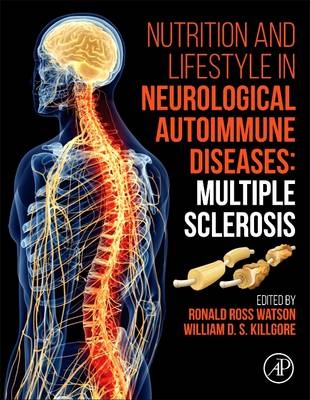
Nutrition and Lifestyle in Neurological Autoimmune Diseases
Academic Press Inc (Verlag)
978-0-12-805298-3 (ISBN)
- Titel ist leider vergriffen;
keine Neuauflage - Artikel merken
This book presents the role of non-pharmaceutical approaches and is essential reading for neurologists, physicians, nurses, nutritionists, dietitians, healthcare professionals, research scientists, biochemists, and general practitioners.
Ronald Ross Watson, PhD, is Professor of Health Promotion Sciences at the University of Arizona, Mel and Enid Zuckerman College of Public Health. Dr. Watson began his research in public health at the Harvard School of Public Health as a Fellow in 1971 doing field work on vaccines in Saudi Arabia. He has done clinical studies in Colombia, Iran, Egypt, Saudi Arabia and the United States which provides a broad international view of public health. He has served in the military reserve hospital for 17 years with extensive training in medical responses to disasters as the chief biochemistry officer of a general hospital, retiring as a Lt. Colonel. He is a distinguished member of several national and international nutrition, immunology, and cancer societies. Dr. Watson’s career has involved studying many lifestyle aspects for their uses in health promotion. He has edited over 100 biomedical reference books and 450 papers and chapters. His teaching and research focuses on alcohol, tobacco, and drugs of abuse in heart function and disease in mouse models. William D. “Scott Killgore, Ph.D., Professor of Psychiatry, Psychology, and Medical Imaging at the University of Arizona (UA). He recently joined the faculty at UA from his previous position as an Associate Professor of Psychology at Harvard Medical School and Research Psychologist at McLean Hospital. Dr. Killgore is Director of the Social, Cognitive, and Affective Neuroscience (SCAN) Laboratory at UA where he leads a large team of researchers focusing on using functional and structural neuroimaging techniques to understanding the brain systems involved in emotional processes and cognitive performance and how these brain-behavior systems may be affected by environmental and lifestyle factors such as insufficient sleep, nutrition, light exposure, physical activity, and stimulants such as caffeine. His current research is funded by several grants from the Department of Defense with the aim of addressing critical performance and mental health needs of active military personnel and returning combat veterans. He is also funded to conduct research into the development and application of novel on-line training and therapy programs reducing psychological problems such as depression and enhancing emotional intelligence skills. In addition to his civilian job, Dr. Killgore is also a Research Psychologist in the U.S. Army Reserve, with over 15 years of military experience, and served five years on active duty at the Walter Reed Army Institute of Research where he studied the effects of sleep deprivation on cognition, mood, judgment, and decision-making.
Section I. Mechanisms of MS Disease Causation and Intervention 1. Epigenetic Changes in DNA Methylation and Environment in Multiple Sclerosis 2. EBV Infection and Vitamin D in Multiple Sclerosis Patients 3. White Matter Abnormalities in MS: Advances in Diffusion Tensor Imaging/Tractography 4. Palmitoylethanolamid and Other Lipid Autacoids Against Neuroinflammation, Pain, and Spasms in Multiple Sclerosis 5. Gateway Reflexes Are Stimulated by Neural Activations and Promote the Pathogenesis of Multiple Sclerosis Models 6. Multiple Sclerosis: Food and Lifestyle in a Neurological Autoimmune Disease 7. Narrative and the Multiple Sclerosis Body
Section II. Vitamins and Minerals in Multiple Sclerosis Causation and Therapy 8. Risk Factors for Low Bone Mineral Density in Multiple Sclerosis 9. Role of Vitamin D in Multiple Sclerosis Pathogenesis and Therapy 10. Multiple Sclerosis in Women: Vitamin D and Estrogen Synergy for Autoimmune T-Cell Regulation and Demyelinating Disease Prevention 11. Dietary Sodium in Multiple Sclerosis
Section III. Behavioral Management of Associated Conditions in Multiple Sclerosis 12. Developing and Applying the Theory of Psychological Adaptation Needs in Patients With Multiple Sclerosis 13. Assessment, Consequence, and Clinical Implication of Asymmetry
Section IV. Environmental Factors and Exercise In Prevention and Treatment of Multiple Sclerosis 14. Neuromuscular Taping and Multiple Sclerosis: Reality or Trend? 15. Constraint-Induced Movement Therapy: When Efficacious Motor Therapy Meets Progressive Disease 16. Physical Activity Behavior in Multiple Sclerosis: Definition, Rates, Outcomes, and Safety 17. Looking Beyond Neurological Impairment in Patients With Multiple Sclerosis During Exercise Intervention: Evidence for Muscular, Cardiac, Pulmonary, and Metabolic Dysfunction Related to Exercise Intolerance and Prognosis 18. Exercise in the Treatment of Multiple Sclerosis: Pragmatic Exercise Intervention in People With Mild to Moderate Multiple Sclerosis—The ExIMS Project 19. Yoga and Pilates as Methods of Symptom Management in Multiple Sclerosis 20. Exercise in Prevention and Treatment of Multiple Sclerosis 21. Physical Activity and Health Promotion for People With Multiple Sclerosis: Implementing Activities in the Community 22. Interdisciplinary Treatment of Patients With Multiple Sclerosis and Chronic Pain
Section V. Drugs of Abuse, Alcohol and Tobacco, and Disease of Multiple Sclerosis Patients 23. Alcohol and Tobacco in Multiple Sclerosis 24. Herbal Oil Supplement With Hot-Nature Diet for Multiple Sclerosis
Section VI. Foods in Multiple Sclerosis 25. The Role of Natural Products in the Prevention and Treatment of Multiple Sclerosis 26. Effects of B Vitamins in Patients With Multiple Sclerosis 27. Eicosapentaenoic Acid in Myelinogenesis: Prospective in Multiple Sclerosis Treatment 28. Biomarkers of Multiple Sclerosis and Their Modulation by Natural Products
| Erscheinungsdatum | 27.01.2017 |
|---|---|
| Verlagsort | San Diego |
| Sprache | englisch |
| Maße | 216 x 276 mm |
| Gewicht | 1060 g |
| Themenwelt | Sachbuch/Ratgeber ► Gesundheit / Leben / Psychologie ► Ernährung / Diät / Fasten |
| Sachbuch/Ratgeber ► Gesundheit / Leben / Psychologie ► Krankheiten / Heilverfahren | |
| Medizin / Pharmazie ► Gesundheitsfachberufe ► Diätassistenz / Ernährungsberatung | |
| Medizin / Pharmazie ► Medizinische Fachgebiete ► Neurologie | |
| Naturwissenschaften ► Biologie ► Zoologie | |
| ISBN-10 | 0-12-805298-8 / 0128052988 |
| ISBN-13 | 978-0-12-805298-3 / 9780128052983 |
| Zustand | Neuware |
| Haben Sie eine Frage zum Produkt? |
aus dem Bereich


